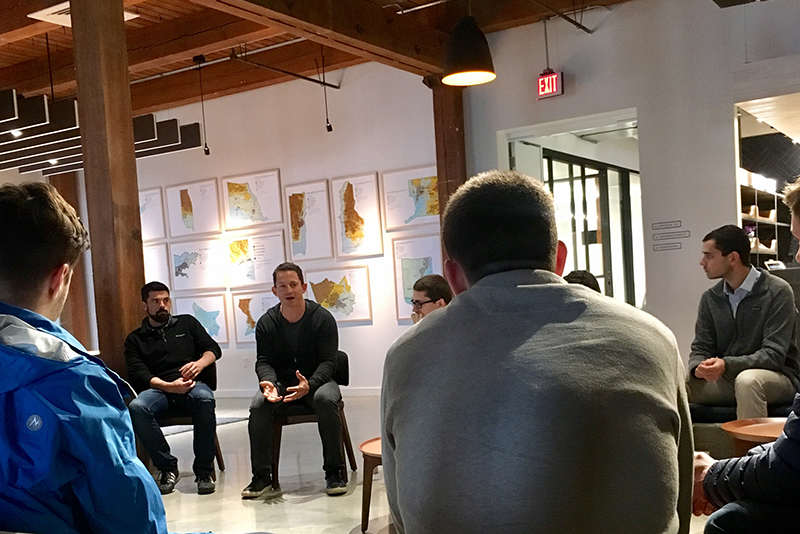
Domain Cos. co-founder Matt Schwartz (BSM ’99), center, shared insights about real estate development as part of a new series of courses designed to connect students with alumni in the field.
You’ve heard of experiential learning, but what about expeditionary learning? For the students who took part in this year’s intersession courses, some of the most exciting learning took place out of the classroom and off campus.
“Going into the city and meeting developers was definitely the most rewarding part of the class for me,” said Patrick Madden (BSM ’18), who took the intersession course on commercial real estate. “There are so many things that you can learn only from actually talking to somebody that’s been in the business.”
Connecting students with alumni in the field was a guiding principle behind the intersession courses, a new series of intensive seminars offered between the fall and spring semesters. Co-taught by Freeman faculty and industry experts, many of whom were alumni, the weeklong courses provided students with a deep dive into five industries: real estate, health care, private equity, energy and law. Each of the courses featured interaction with industry professionals, visits to industry-related sites and a hands-on project that enabled students to apply their knowledge in a real-world setting.
“We’ve always connected our teaching with industry practice, but the intersession courses took that to a new level,” said Ira Solomon, dean of the Freeman School.
Among the alumni who volunteered their time to co-teach courses were Casey Herman (BSM ’86), U.S. Power & Utilities Industry Leader with PricewaterhouseCoopers, Stacey Berger (A&S ’76, MBA ’78), executive vice president of Midland Loan Services/PNC Real Estate, and Dave Sislen (A&S ’76), president of Bristol Capital Corp. The classes also incorporated substantial interactions with notable alumni including James Maurin (MBA ’72), former chairman of Stirling Properties, Jeremy Crigler (BSM ’88), chief investment officer of Tulane University, and Matt Schwartz (BSM ’99), co-founder of the Domain Cos.
“I think what the students liked was the strong connection between academic and real-world application,” said Mike Hogg, associate dean for undergraduate programs. “I think they also liked that these were project-based courses, so they were much more hands-on than the traditional full-semester academic classes.”
The centerpiece of the real estate course, for example, was a case competition that used as its focus an actual project currently being developed in New Orleans: an extended-stay hotel across from the new downtown medical center. The students visited the site, met with the developer and reviewed the project’s pro forma financials in order to evaluate its potential and make investment recommendations.
“I think visiting the property and meeting the developer really contributed to the real-world feel of the project,” said real estate student Matt Newman (BSM ’18). “Unlike some cases, this was really happening, and there wasn’t a right or wrong answer.”
While January’s intersession courses served as a pilot program of sorts, Solomon says Freeman is planning to replicate the model with additional courses in the future.
“Alumni are one of our most valuable educational resources,” Solomon said. “By engaging students with alumni professionals — ideally many alumni professionals — students develop a much deeper understanding of industry, and they’re also able to learn about career paths and build their networks. It’s a most exciting formula, and one we’re looking forward to developing further.”
Students who took the courses seem to agree.
“It was just a really good class,” Madden said. “Probably one of the best I’ve taken at Freeman.”

